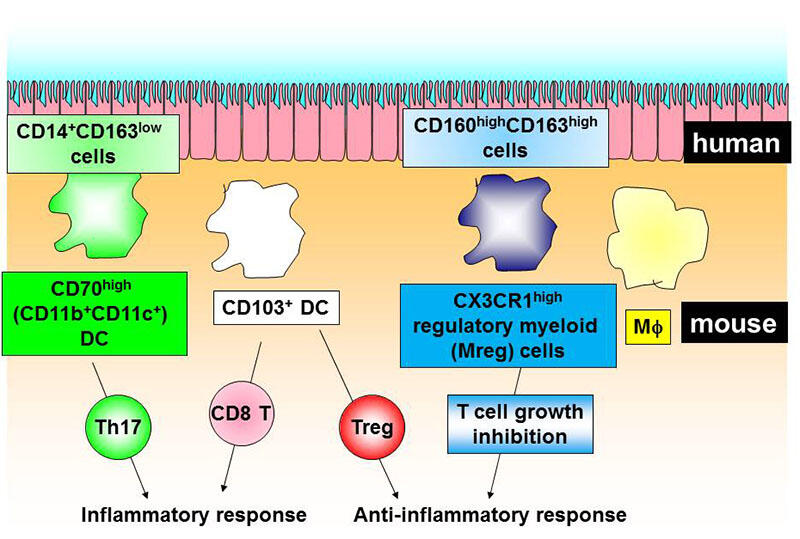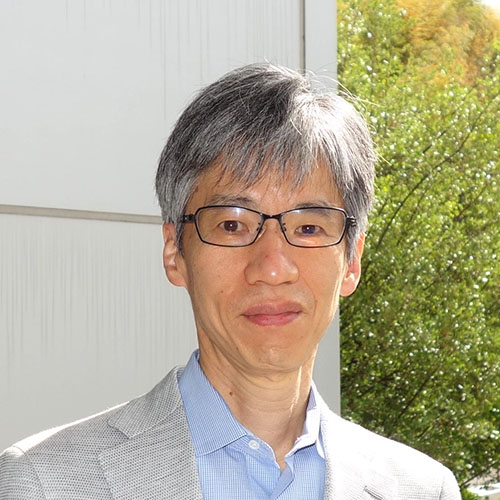Mucosal Immunology
TEL +81-6-6879-3982
FAX +81-6-6879-3989
Overview
Our laboratory is analyzing the mechanisms for the maintenance of intestinal homeostasis to reveal the pathogenesis of inflammatory bowel diseases (IBD), represented by Crohn’s diseases and ulcerative colitis. In particular, our research focuses on the following three intestinal factors.
- Intestinal immunity: We characterize unique functions and regulatory mechanisms of innate myeloid cells residing in the intestinal lamina propria.
- Intestinal environmental factors: We analyze the effect of microbiota and dietary components on the host immunity.
- Intestinal epithelial cells: We analyze barrier functions of a single layer of intestinal epithelial cells, which separate intestinal immunity and intestinal environmental factors.


Principal Investigator
Kiyoshi Takeda Professor

Research field
Study of the mechanisms regulating intestinal homeostasis for elucidation of the pathogenesis of inflammatory bowel diseases
Education history
| 1986-1992 | Osaka University, Medical School obtained M.D. degree at 1992 |
|---|---|
| 1994-1998 | Osaka University, Graduate School of Medicine obtained Ph.D. degree at 1998 |
Research and career history
| 1998 | Research Associate; Department of Biochemistry, Hyogo College of Medicine, Hyogo |
|---|---|
| 1999 | Research Associate; Department of Host Defense, Research Institute for Microbial Diseases, Osaka University, Osaka (-2003) |
| 2003 | Professor; Department of Molecular Genetics Medical Institute of Bioregulation, Kyushu University, Fukuoka (-2007) |
| 2007 | Professor; Department of Microbiology and Immunology Graduate School of Medicine, Osaka University (-Present) |
| 2019.7 | Director, Osaka University Immunology Frontier Research Center |
Prize
| 2004 | The 7th Award of the Japanese Society for Immunology |
|---|---|
| 2009 | 6th Japan Society for the Promotion of Science Prize |
| 2016 | The 34th Osaka Science Prize |
| 2016 | The 53rd Bälz Prize |
| 2019 | Mochida Memorial Academic Award |
| 2022 | Takeda Prize for Medical Science |
| 2024 | 2024 Takamine Memorial Daiichi Sankyo Award |
Members
- Kiyoshi Takeda Professor
ktakedaongene.med.osaka-u.ac.jp - Hisako Kayama Associate Professor
kayamaongene.med.osaka-u.ac.jp - Ryu Okumura Assistant Professor
okumuraongene.med.osaka-u.ac.jp - Mari Murakami Assistant professor
marimongene.med.osaka-u.ac.jp - Taiki Sakaguchi Assistant professor
sakaguchiongene.med.osaka-u.ac.jp
Achievements
Publications
-
Fujimoto K, Kinoshita M, Tamura A, Tanaka H, Okuzaki D, Shimada Y, Kayama H, Okumura R, Furuta Y, Narazaki M, Hatakeyama S, Ikawa M, Tsuchiya K, Watanabe M, Kumanogoh A, Tsukita S, and Takeda K: Regulation of intestinal homeostasis by the ulcerative colitis-associated gene RNF186. Mucosal Immunol 10, 446-259 (2017)
-
Maeda Y, Kurakawa T, Umemoto E, Motooka D, Ito Y, Gotoh K, Hirota K, Matsushita M, Furuta Y, Narazaki M, Sakaguchi N, Kayama H, Nakamura S, Iida T, Saeki Y, Kumanogoh A, Sakaguchi S, and Takeda K: Dysbiosis contributes to arthritis development via activation of autoreactive T cells in the intestine. Arthritis Rheum. 68, 2646-2661 (2016).
-
Okumura R, Kurakawa T, Nakano T, Kayama H, Kinoshita M, Motoka D, Gotoh K, Kimura T, Kamiyama N, Kusu T, Ueda Y, Wu H, Iijima H, Barman S, Osawwa H, Matsuno H, Nishimura J, Ohba Y, Nakamura S, Iida T, Yamamoto M, Umemoto E, Sano K, and Takeda K: Lypd8 promotes the segregation of flagellated microbiota and colonic epithelia. Nature 532, 117-121 (2016).
-
Tsai, S. H., Kinoshita, M., Kusu, T., Kayama, H., Okumura, R., Ikeda, K., Shimada, Y., Takeda, A., Yoshikawa, S., Kurashima, Y., Sato, S., Umemoto, E., Kiyono, H., Karasuyama, H. and Takeda, K.: Ectoenzyme E-NPP3 (CD203c) negatively regulates ATP-dependent chronic allergic responses by basophils and mast cells. Immunity 42, 279-293 (2015).
-
Masahata, K., Umemoto, E., Kayama, H., Kotani, M., Nakamura, S., Kurakawa, T., Kikuta, J., Gotoh, K., Motooka, D., Sato, S., Higuchi, T., Baba, Y., Kurosaki, T., Kinoshita, M., Shimada, Y., Kimura, T., Okumura, R., Takeda, A., Tajima, M. Yoshie, O., Fukuzawa, M., Kiyono, H., Fagarasan, S., Iida, T., Ishii, M. and Takeda,K.: Generation of colonic IgA-secreting cells in the cecal patch. Nat. Commun. 5, 3704 (2014)
-
Ogino, T., Nishimura, J., Barman, S., Kayama, H., Uematsu, S., Haraguchi, N., Uemura, M., Hata, T., Takemasa, I., Mizushima, T., Yamamoto, H., Takeda, K., Doki, Y., and Mori, M.: Increased Th17-inducing activity of CD14(+) CD163(low) myeloid cells in intestinal lamina propria of patients with Crohn's disease. Gastroenterol. 145, 1380-1391 (2013).
-
Kimura, T., Katoh, H., Kayama, H., Saiga, H., Okuyama, M., Okamoto, T., Umemoto, E., Matsuura, Y., Yamamoto, M. and Takeda, K.: Ifit1 inhibits JEV replication through binding to 5' capped 2'-O unmethylated RNA. J. Virol. 87, 9997-10003 (2013).
-
Kusu, T., Kayama, H., Kinoshita, M., Jeon, S.G., Ueda, Y., Goto, Y., Okumura, R., Saiga, H., Kurakawa, T., Ikeda, K., Maeda, Y., Nishimura, J., Arima, Y., Atarashi, K., Honda, K., Murakami, M., Kunisawa, J., Kiyono, H., Okumura, M., Yamamoto, M., and Takeda, K.: ENTPDase7 controls Th17 cell responses through regulation of luminal ATP in the small intestine. J. Immunol. 190, 774-783 (2013).
-
Kinoshita, M., Kayama, H., Kusu, T., Yamaguchi, T., Kunisawa, J., Kiyono, H., Sakaguchi, S. and Takeda, K.: Dietary folic acid promotes survival of Foxp3+ regulatory T cells in the colon. J. Immunol. 189, 2869-2878 (2012).
-
Yamamoto, M., Okuyama, M., Ma, J. S., Kimura, T., Kamiyama, N., Saiga, H., Ohshima, J., Kayama, H., Okamoto, T., Huang, D. C. S., Soldati-Farve, D., Horie, K., Takeda, J. and Takeda, K.: A cluster of IFN--inducible p65 GTPases plays a critical role in host defense against Toxoplasma gondii. Immunity 37, 302-313 (2012).
-
Jeon, S. G., Kayama, H., Ueda, Y., Takahashi, T., Asahara, T., Tsuji, H., Tsuji, N. M., Kiyono, H., Ma, J. S., Kusu, T., Okumura, R., Hara, H., Yoshida, H., Yamamoto, M., Nomoto, K. and Takeda, K.: Probiotic Bifidobacterium breve induces IL-10-producing Tr1 cells in the colon. PLoS Pathogens 8, e1002714 (2012).
-
Kayama, H., Ueda, Y., Sawa, Y., Jeon, S. G., Ma, J. S., Okumura, R., Kubo, A., Ishii, M., Okazaki, T., Murakami, M., Yamamoto, M., Yagita, H. and Takeda, K.: Intestinal CX3C chemokine receptor 1high (CX3CR1high) myeloid cells prevent T cell-dependent colitis. Proc. Natl. Acad. Sci. USA. 109, 5010-5015 (2012).
-
Yamamoto, M., Ma, J. S., Mueller, C., Kamiyama, N., Saiga, H., Kubo, E., Kimura, T., Okamoto, T., Okuyama, M.., Kayama, H., Nagamune, K., Takashima, S., Matsuura, Y., Soldati-Farve, D. and Takeda, K.: ATF6 is a host cellular target of the Toxoplasma gondii virulence factor ROP18. J. Exp. Med. 208, 1533-1546 (2011).
-
Yamamoto, M., Standley, D.M., Takashima, S., Saiga, H., Okuyama, M., Kayama, H., Kubo, E., Ito, H., Takaura, M., Matsuda, T., Soldati-Farve, D., and Takeda, K.: A single polymorphic amino acid on Toxoplasma gondii kinase ROP16 determines the direct and strain-specific activation of Stat3. J. Exp.Med. 206, 2747-2760 (2009).
-
Kayama, H., Koga, R., Atarashi, K., Mak, T. W., Takayanagi, H., Honda, K., Yamamoto, M. and Takeda, K.: NFATc1 mediates Toll-like receptor-independent innate immune responses during Trypanosoma cruzi infection. PLoS Pathogens 5, e1000514 (2009).Atarashi, K., Nishimura, J., Shima, T., Umesaki, Y., Yamamoto, M., Onoue, M., Yagita, H., Ishii, N., Evans, R., Honda, K., and Takeda, K.: ATP drives lamina propria TH17 cell differentiation. Nature 455, 808-812 (2008).
-
Kayama, H., Ramirez-Carrozzi, V. R., Yamamoto, M., Mizutani, T., Kuwata, H., Iba, H., Matsumoto, M., Honda, K., Smale, S. T., and Takeda, K.: Class-specific regulation of pro-inflammatory genes by MyD88 pathways and IB. J. Biol. Chem. 283, 12468-12477 (2008).
-
Koga, R., Hamano, S., Kuwata, H., Atarashi, K., Ogawa, M., Hisaeda, H., Yamamoto, M., Akira, S., Himeno, K., Matsumoto, M., and Takeda, K.: TLR-dependent induction of IFN- mediates host defense against Trypanosoma cruzi. J. Immunol. 177, 7059-7066 (2006).
-
Kuwata, H., Matsumoto, M., Atarashi, K., Morishita, H., Hirotani, T., Koga, R., and Takeda, K.: IBNS inhibits induction of a subset of Toll-like receptor-dependent genes and limits inflammation. Immunity 24, 41-51 (2006).
